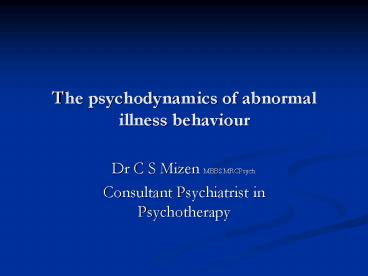The psychodynamics of abnormal illness behaviour - PowerPoint PPT Presentation
1 / 15
Title:
The psychodynamics of abnormal illness behaviour
Description:
Dysmorphophobia. Factitious disorder and malingering. Illness behaviour and personality disorder ... Dysmorphophobia. Obsessive compulsive. Factitious disorder ... – PowerPoint PPT presentation
Number of Views:500
Avg rating:3.0/5.0
Title: The psychodynamics of abnormal illness behaviour
1
The psychodynamics of abnormal illness behaviour
- Dr C S Mizen MBBS MRCPsych.
- Consultant Psychiatrist in Psychotherapy
2
Medically unexplained symptoms
- Somatization disorder
- Hypochondriacal disorder
- Persistent pain disorder
- Conversion disorder
- Chronic fatigue syndrome
- Neurasthenia
- Dysmorphophobia
- Factitious disorder and malingering
3
Illness behaviour and personality disorder
- Somatization disorder
- Dramatic emotional type
- Paranoid Hostile type
- Passive aggressive dependant type
- Hypochondriacal disorder
- High neuroticism and negative affectivity,
- 2/3 above PD caseness Obsessionality and
Narcissism - Persistent pain disorder
- Histrionic, narcissistic, avoidant and dependent
4
Illness behaviour and Personality Disorder
- Conversion disorder
- Neurotic/borderline/hysterical
- Chronic fatigue syndrome
- Perfectionist obsessive compulsive
- Dysmorphophobia
- Obsessive compulsive
- Factitious disorder and malingering
- Most meet the criteria for personality disorder
5
Borderline Psychoanalytic definition (Kernberg)
- Symptoms
- Multiple phobias
- Obsessive compulsive symptoms
- Multiple/ bizarre conversion symptoms
- Dissociative reactions
- Hypochondriasis
- Polymorphous perverse sexual trends
- Classical pre-psychotic personality structures
Paranoid, Schizoid and hypo-manic
6
Borderline Psychoanalytic definition (Kernberg)
- Structural analysis
- Non specific manifestations of ego weakness e.g.
lack of anxiety tolerance, impulse control and
sublimatory channels - Shift towards primary process thinking
- Specific defensive operations
- Persistence of splitting
- Regressive refusion of self and objects
- Lack of apparatus for autonomy
- Lack of anxiety tolerance (Constitutional)
- Excessive frustration in reality
- Consequent excess of aggression
7
Formulation
- Thinking about management of patients in
psychiatric practice on a day to day basis. - Thinking about the needs of patients who present
with abnormal illness behaviour who served poorly
by mental health services at great financial
cost. - As an example of how such a formulation can be
applied to service design.
8
Patient B
- 25 year old single woman
- Current circumstances
- History of current complaint
- Personal History
- Counter transference
9
Formulation Depressive position
- A beginning requires coming to terms with an
ending. Each greeting implies a parting. - A mixture of sadness and pleasure in both being
with and being apart. - Reconciliation of impotence and omnipotence
towards recognition of limitations, external
realities and tolerance of loss.
10
Formulation Splitting
11
The Borderline Solution
Sit on the fence
Oscillation
One foot in each camp
12
Patient B
- Prior to injury
- Post injury
- Relation to history
- Implications for management.
- Whole team/system approach
- Integration of splitting in team
- A therapeutic model which can work across
agencies - Overarching philosophy
13
Implications for service development
- Personality Disorder as a Mental Illness.
- Responsibility splits in professional views.
- Neuroscientific perspective
- Rationale for inclusion within secondary mental
health services. - Treatability
- De-escalation of Risk to Self and others
- Management of chronic disability/suffering/social
consequences. - Not doing harm.
14
Implications
- Boundary issues
- Access to secondary mental health services
- Above
- Access to inpatient beds
- Assessment
- Risk management
- Containment in the service of therapeutic goals
- Medication management
- Rare
- Brief
- Proactive/planned
- Psychotherapeutically informed.
15
Aims
- Therapy
- Provide adequate access to evidence based
therapies. - Whole team approach fostering adult
functioning. - Service design which does not replicate the
claustrum. - Consultation
- Provide psychotherapeutically informed risk
assessment. - Provide psychotherapeutically informed
management. - Training
- Well informed and trained care coordination and
primary care input. - Cohesive interagency working
- Appropriate models
- Organisational structures which facilitate and
incentivize co-operation































